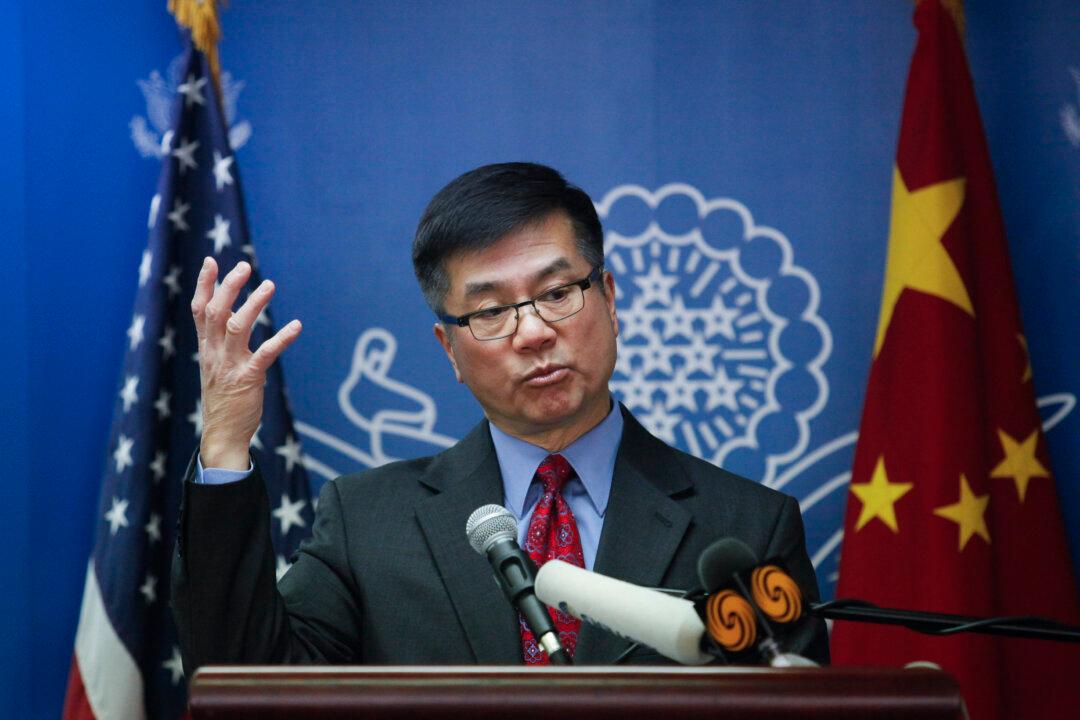Gary Locke, the outgoing U.S. ambassador to China, said on Feb. 26 that the development of the rule of law and a range of other civil liberties in the communist country would be crucial for its future development.
“China has a great future ahead of it,” Locke said, in remarks made at a U.S. cultural center in Beijing, according to Voice of America. “But reaching its full potential will depend on a neutral and respected judiciary, an active set of dedicated lawyers, wise leadership, but most of all, reverence toward the rule of law.”
He added, “It will depend on respect for the constitutionally guaranteed freedom of speech for all, an open Internet, a well-informed citizenry willing to engage in unrestricted dialogue on how best to build a stable and progressive future for China.”
The Chinese Communist Party has this year embarked on a high-profile campaign to stamp out discussion of these principles, and has persecuted those Chinese citizens who publicly uphold them.
Locke said that the United States was “deeply concerned” over the recent pattern of “harassment, arrests, prosecutions of good government advocates, of public interest lawyers, of activists, Internet journalists, religious leaders, and even others in China.”
He continued, “The United States calls on China to guarantee peaceful activists the protections and freedoms to which they’re entitled under China’s international human rights commitments.”
Locke, the first Chinese-American ambassador to the People’s Republic of China, has been there for two-and-a-half years, during which time he has seen a number of unusual incidents. In February 2012, Wang Lijun, the police chief of Chongqing, sought to defect to the American consulate in Chengdu; then, in May of 2012, the blind dissident Chen Guangcheng escaped lockup in his home village and defected to the American Embassy in Beijing.
Fame first came to Locke in China, however, when he was spotted in a Starbucks in Beijing—with a Nike backpack on and daughter Emily in toe—ordering a coffee. Though this is normal by American standards, Chinese were impressed by what they saw as the humility of the ambassador. A Chinese official in his position would typically have had an underling carry out such mundane tasks, Internet users said.
These and other highlights led to some assessing Locke as “the Best-Ever American Ambassador to the P.R.C.”
In response to his recent comments on human rights in China, the regime’s foreign ministry spokeswoman, Hua Chunying, said the remarks were “thoughtless” and a matter of China’s “internal affairs,” according to Voice of America.
Hua indicated that “mutual respect,” a concept that the Chinese regime has recently sought to stress, and make an official part of the U.S.-China relationship, would preclude commentary about human rights conditions in China by U.S. officials.
American policymakers, for their part, have in recent months largely demurred from taking the Chinese regime up on its hopes for what it calls “mutual respect.” Instead, they have called on the Chinese Communist Party to follow international law in its maritime disputes with neighboring countries, and encouraged the development of human rights in China.
Ambassador Locke will be replaced by Max Baucus, a Democratic Senator from Montana. During his confirmation hearing, Baucus appeared to hold reservations about Chinese demands that the United States not say anything about the regime’s human rights abuses. “We‘ll just keep working at it,” he said, “and we’ll make some headway here.”
Departing US Ambassador to China Talks Human Rights
Outgoing U.S. Ambassador to China, Gary Locke, stressed human rights in a speech marking his exit from the position.

U.S. Ambassador to China Gary Locke delivers his farewell speech at the Beijing American Center on Feb. 26, 2014 in Beijing. Locke said that Clinton is strong on human rights. ChinaFotoPress/Getty Images
|Updated:
Matthew Robertson is the former China news editor for The Epoch Times. He was previously a reporter for the newspaper in Washington, D.C. In 2013 he was awarded the Society of Professional Journalists’ Sigma Delta Chi award for coverage of the Chinese regime's forced organ harvesting of prisoners of conscience.
Author’s Selected Articles




